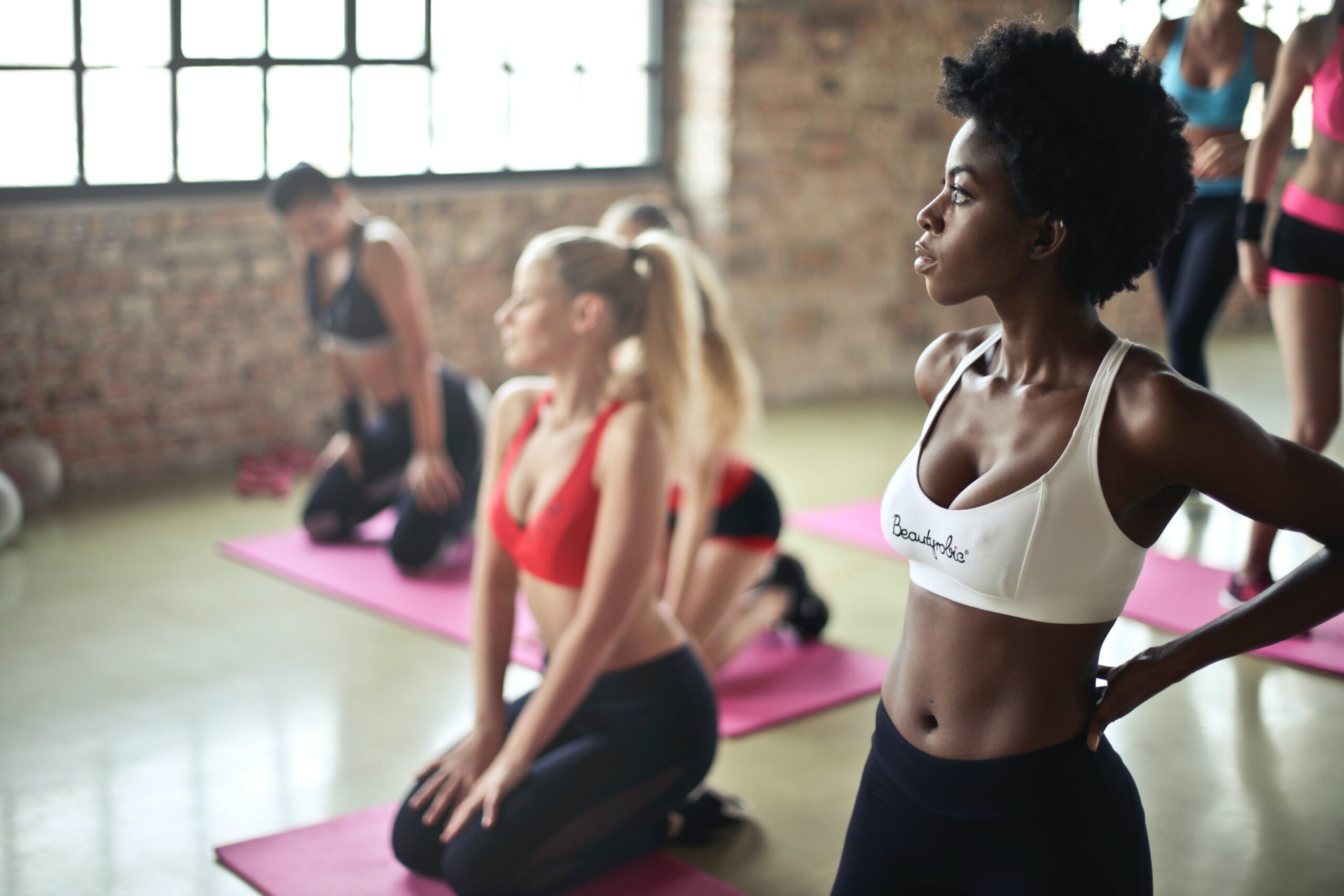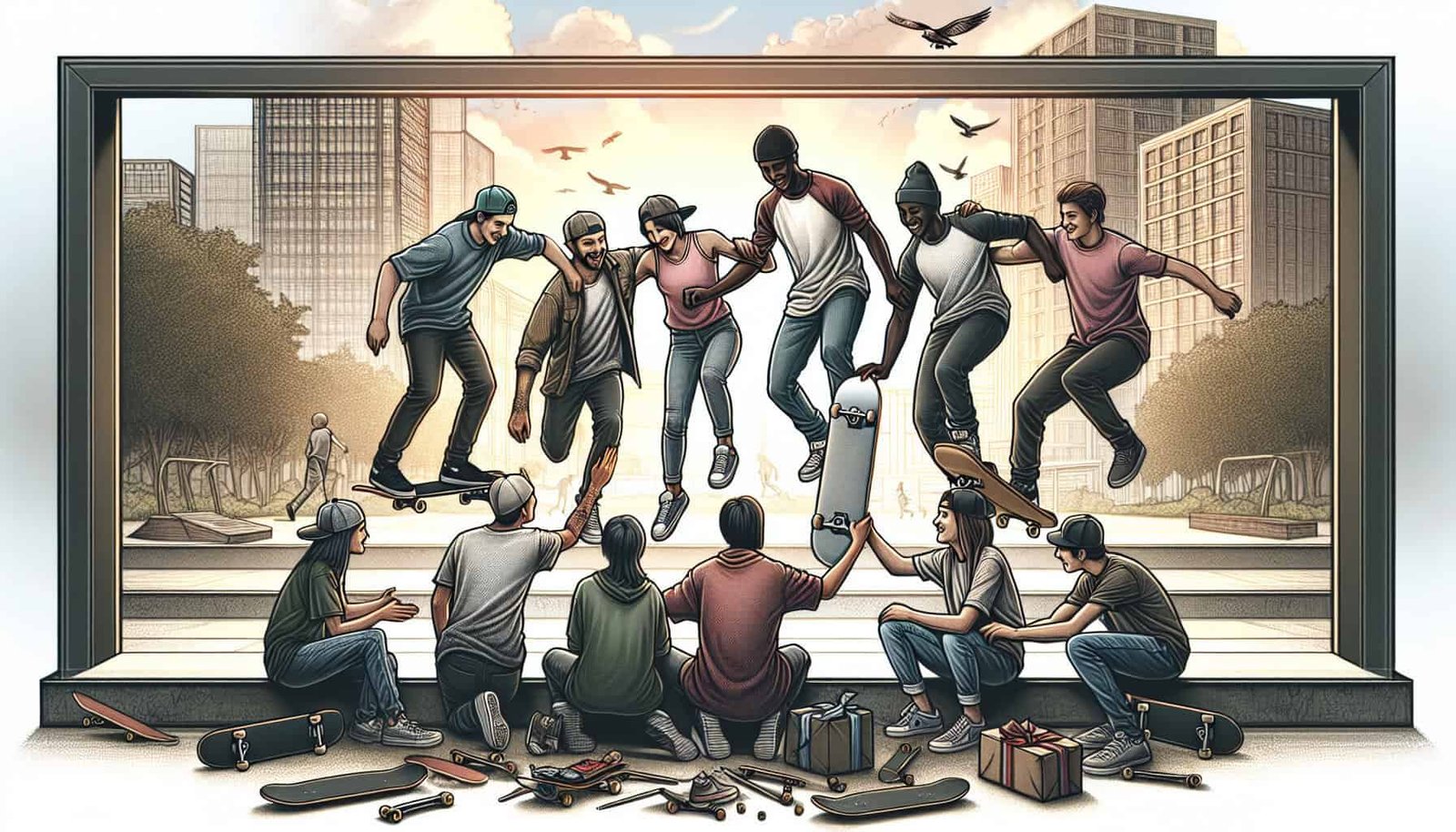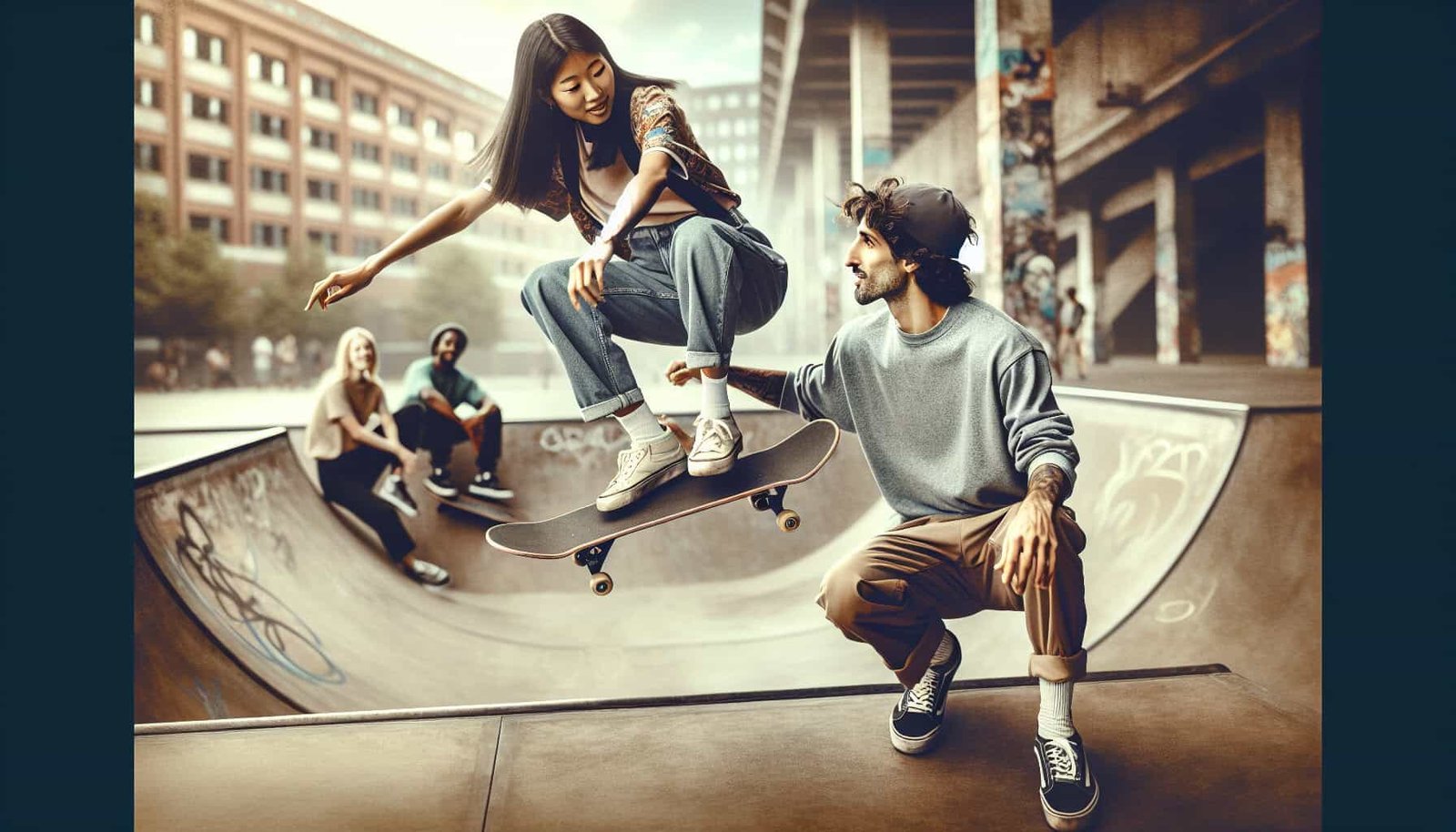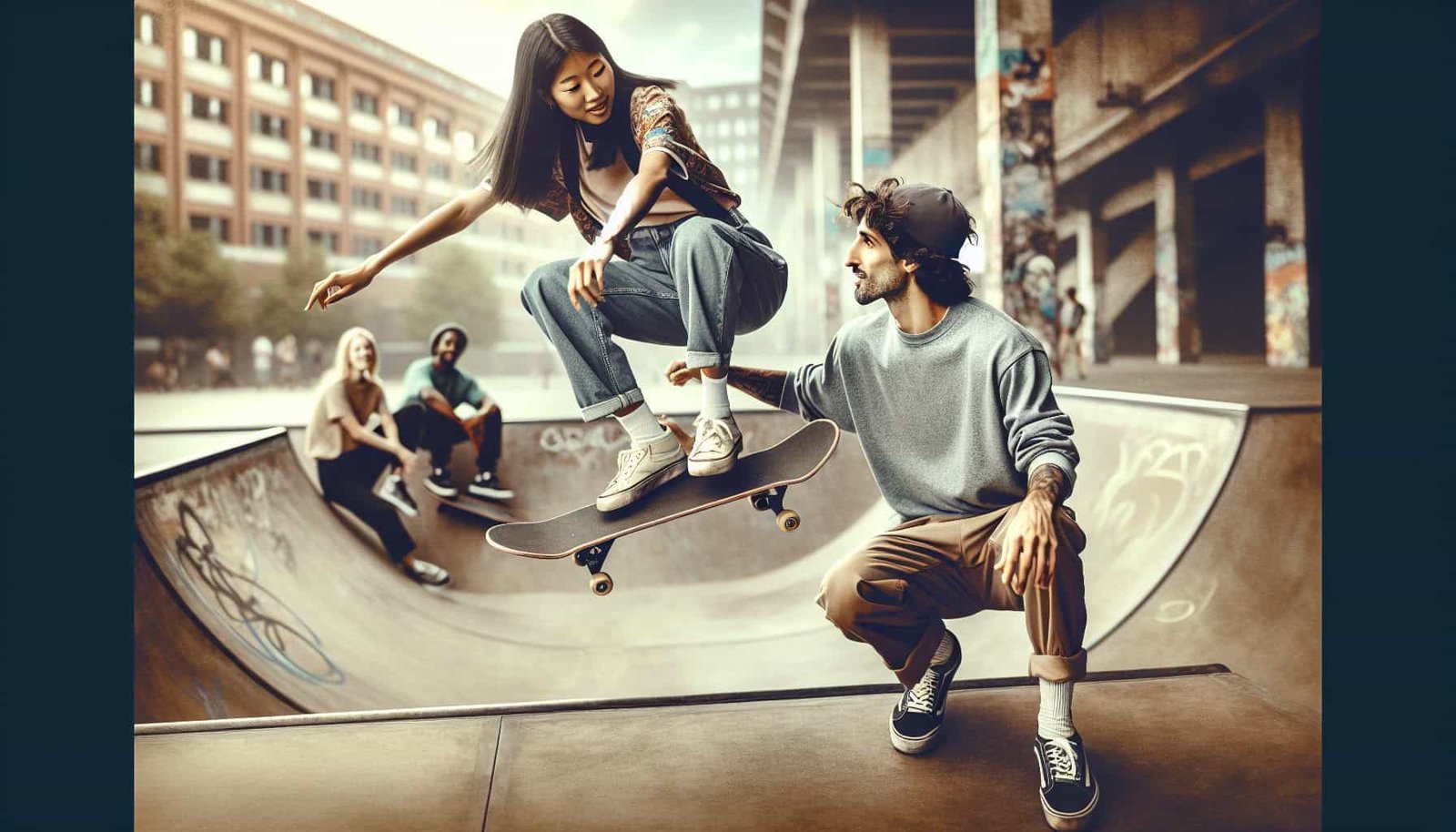Skateboarding is more than just a sport; it’s a vibrant community built on support and camaraderie. When it comes to improving your skills on the board, the role of peer feedback and coaching cannot be underestimated. By tapping into the collective wisdom of your fellow skaters and receiving guidance from experienced coaches, you can accelerate your progression and unlock new levels of achievement. In this article, we will explore the transformative power of peer feedback and coaching in the world of skateboarding. So, grab your board and get ready to dive into this thrilling journey of growth and collaboration!

Understanding Skateboarding Progression
Skateboarding progression refers to the continual improvement and development of skills and techniques in the sport of skateboarding. It involves the constant pursuit of learning new tricks, mastering existing ones, and refining overall skateboarding abilities. Progression is not only about pushing the boundaries of what is possible on a skateboard but also about personal growth and self-expression.
Defining Skateboarding Progression
Skateboarding progression is a journey without a destination. It is an ongoing process that allows skateboarders to challenge themselves, push their limits, and reach new levels of proficiency. Progression can be measured in various ways, such as the ability to learn more advanced tricks, mastering difficult maneuvers, or refining overall style and technique. It is a personal and subjective experience that varies for each skateboarder.
The Importance of Progression in Skateboarding
Progression is the lifeblood of skateboarding. It is what drives skateboarders to keep pushing themselves and continuously strive for improvement. Without progression, skateboarding would stagnate, becoming repetitive and uninteresting. Progression not only brings excitement and fulfillment to skateboarders but also drives innovation within the entire skateboarding community. It inspires others to push their own boundaries and explore new possibilities.
Peer Feedback in Skateboarding Progression
What is Peer Feedback?
Peer feedback is the process of receiving constructive criticism, advice, and encouragement from fellow skateboarders who have similar or higher skill levels. It provides an invaluable external perspective on one’s skateboarding abilities. Peer feedback can be informal, such as comments made during a skate session, or more formal, such as organized feedback sessions or video reviews.
Benefits of Peer Feedback in Skateboarding
Peer feedback offers numerous benefits to skateboarders on their journey of progression. Firstly, it provides a fresh and objective perspective on one’s skating abilities, allowing for self-reflection and identification of areas for improvement. Secondly, it fosters a sense of camaraderie and community within the skateboarding scene, as skateboarders support and help each other grow. Lastly, peer feedback boosts confidence and motivation, as positive reinforcement and constructive criticism inspire skateboarders to continue pushing their limits.
Types of Peer Feedback in Skateboarding
Peer feedback can take many forms, depending on the context and the individuals involved. It can be as simple as verbal encouragement or words of advice exchanged during a skate session. It can also be more structured, such as peer-led feedback sessions, where skateboarders take turns evaluating each other’s performances and offering constructive criticism. Additionally, peer feedback can occur in the form of video reviews, where skateboarders analyze and provide feedback on each other’s recorded skateboarding sessions.
Tips for Giving and Receiving Effective Peer Feedback
Giving and receiving effective peer feedback requires both open-mindedness and a supportive attitude. When giving feedback, it is important to be specific, constructive, and respectful. Focus on highlighting areas of improvement rather than criticizing mistakes. When receiving feedback, listen attentively, remain open to suggestions, and appreciate the effort and insights shared by others. Remember to view feedback as an opportunity for growth rather than as a personal attack.

Coaching in Skateboarding Progression
Role of Coaching in Skateboarding
Coaching plays a crucial role in skateboarding progression by providing structured guidance, technical expertise, and mentorship to skateboarders. A skateboarding coach helps skateboarders refine their skills, develop proper technique, and navigate through the challenges of learning new tricks. They offer a structured framework for skill development and provide personalized instruction tailored to individual needs. Additionally, a coach can offer valuable insights, encouragement, and support throughout the progression journey.
Qualities of a Good Skateboarding Coach
A good skateboarding coach possesses several key qualities that contribute to effective guidance and support. Firstly, they should have a deep understanding of skateboarding fundamentals, techniques, and safety practices. Secondly, they should be patient, supportive, and able to adapt their teaching methods to accommodate different learning styles. Good coaches are also skilled communicators, able to convey complex concepts and instructions in a clear and concise manner. Lastly, a good skateboarding coach is passionate about the sport and genuinely invested in the growth and success of their students.
Benefits of Coaching in Skateboarding Progression
Coaching offers numerous benefits to skateboarders aiming to progress in their skills and abilities. Firstly, a coach provides structured training plans and progression strategies, allowing skateboarders to set clear goals and track their improvement over time. Secondly, coaching helps skateboarders avoid common mistakes and learn proper technique, reducing the risk of injuries and promoting safe skateboarding practices. Moreover, a coach offers motivation, accountability, and a source of inspiration, encouraging skateboarders to push through challenges and stay committed to their progression journey.
Different Coaching Techniques in Skateboarding
Coaching techniques in skateboarding can vary depending on the coach’s philosophy and the individual needs of the skateboarder. Some coaches focus on the “breakdown” approach, where they deconstruct complex tricks into smaller components and guide skateboarders through each step of the learning process. Others may adopt a more holistic approach, emphasizing overall body awareness, balance, and creativity. Additionally, technology, such as video analysis and slow-motion footage, can be incorporated into coaching sessions to provide visual feedback and enhance skill development.
Choosing the Right Coach
Choosing the right skateboarding coach is crucial for maximizing progress and ensuring a positive coaching experience. When selecting a coach, consider their qualifications, experience, and reputation within the skateboarding community. It is also important to assess their coaching style and philosophy, ensuring it aligns with personal goals and learning preferences. Seek out testimonials or recommendations from other skateboarders who have worked with the coach to gauge their effectiveness and commitment to student growth.
The Relationship Between Peer Feedback and Coaching
Complementing Roles of Peer Feedback and Coaching
Peer feedback and coaching play complementary roles in skateboarding progression. While coaching offers structured guidance, technical expertise, and personalized instruction, peer feedback provides external perspectives, support, and encouragement from fellow skateboarders. Together, they create a well-rounded approach that addresses both the technical and social aspects of skateboarding progression.
How Peer Feedback Enhances Coaching
Peer feedback enhances coaching by providing additional insights and perspectives. Skateboarders can learn from each other’s experiences, adapt different approaches, and gain a deeper understanding of various tricks and techniques. Peer feedback also fosters a sense of healthy competition, as skateboarders push each other to reach new heights. By incorporating peer feedback into coaching sessions, coaches can encourage collaboration, self-reflection, and creativity while strengthening the supportive community aspect of skateboarding.
How Coaching Supports Peer Feedback
Coaching supports peer feedback by providing a structured framework for skill development. Coaches can identify areas of improvement and provide specific technical guidance to help skateboarders address those areas. Additionally, coaches can help skateboarders interpret and apply peer feedback effectively, ensuring that it contributes to skill progression. By bridging the gap between peer feedback and the technical aspects of skateboarding, coaches facilitate the integration of feedback into a focused and productive practice routine.
Collaborative Approaches for Optimal Progression
Collaborative approaches that combine peer feedback and coaching can optimize skateboarding progression. Coaches can incorporate peer feedback sessions into their training programs, encouraging skateboarders to share advice, evaluate each other’s performances, and provide constructive criticism. This collaborative environment fosters mutual learning and growth while encouraging skateboarders to take an active role in their own progression. By promoting both individual and collective improvement, the relationship between peer feedback and coaching becomes a catalyst for accelerated progression.

The Impact of Peer Feedback and Coaching on Skill Development
Building Skills Through Peer Feedback
Peer feedback plays a significant role in building skills in skateboarding. It offers skateboarders a fresh perspective on their strengths and weaknesses, enabling them to identify areas for improvement. By receiving feedback from peers who have faced similar challenges, skateboarders can learn new strategies, techniques, and approaches. This collective wisdom fuels skill development by providing a broader range of experiences and insights that may not be present in individual practice sessions.
Improving Technique and Style with Coaching
Coaching is instrumental in improving technique and style in skateboarding. Skilled coaches can assess a skateboarder’s form, identify areas that need refinement, and provide targeted instruction to enhance technical proficiency. They can teach proper body mechanics, foot placement, and weight distribution, enabling skateboarders to execute tricks more efficiently and with greater consistency. Moreover, coaching can help skateboarders develop their own unique style by emphasizing creativity, self-expression, and individuality within the boundaries of proper technique.
Combining Peer Feedback and Coaching for Faster Progression
When peer feedback and coaching are combined, skateboarders can experience faster progression. Peer feedback provides valuable outside perspectives, while coaching offers structured guidance and expertise. By integrating both approaches, skateboarders can leverage the collective knowledge and support of peers while benefiting from the technical guidance and individualized instruction of a coach. This combination fosters a comprehensive learning environment that accelerates skill development and promotes continuous improvement.
Case Studies: Success Stories in Skateboarding through Peer Feedback and Coaching
Numerous success stories highlight the impact of peer feedback and coaching on skateboarding progression. Skateboarders who actively seek and incorporate peer feedback, along with the guidance of a skilled coach, often make significant strides in their skills and abilities. These success stories exemplify the power of collaboration, support, and a growth mindset in propelling skateboarders to new levels of achievement. Whether it’s mastering a challenging trick, winning a competition, or inspiring others, these stories demonstrate the transformative potential of peer feedback and coaching in skateboarding.
Challenges and Limitations of Peer Feedback and Coaching
Obstacles to Effective Peer Feedback in Skateboarding
Effective peer feedback can face several obstacles in the skateboarding context. Firstly, ego and competitiveness may hinder honest and constructive feedback, as some skateboarders may feel threatened by others’ progress. Secondly, the lack of knowledge or experience in evaluating technical aspects may limit the quality and accuracy of the feedback provided. Additionally, the skateboarding community’s diversity may present challenges in aligning preferences, styles, and expectations when it comes to feedback.
Addressing the Limitations of Coaching
Coaching in skateboarding also has limitations that need to be addressed. Access to qualified coaches and financial constraints may limit the availability of coaching opportunities for aspiring skateboarders. Additionally, coaching is often a one-on-one experience, making it challenging for coaches to provide personalized attention and feedback in group settings. It is important to recognize these limitations and explore alternative approaches, such as peer-led coaching and mentorship programs, to foster progress and development within the skateboarding community.
Overcoming Challenges for Effective Skill Progression
To overcome the challenges associated with peer feedback and coaching, skateboarders and the skateboarding community must prioritize open communication, collaboration, and mutual support. Creating a safe and inclusive environment that encourages constructive feedback, where skateboarders feel comfortable seeking guidance and sharing their experiences, is essential. Education and training programs can also be implemented to enhance the skills of both peer reviewers and coaches, ensuring they are equipped with the necessary knowledge and tools to provide valuable feedback and guidance.

Creating a Supportive Environment for Peer Feedback and Coaching
Establishing a Skateboarding Community
Creating a supportive environment for peer feedback and coaching starts with establishing a strong skateboarding community. This can be achieved through community events, skate jams, and local skateboarding organizations. By bringing skateboarders together, these initiatives foster connections, friendships, and a sense of belonging, making it easier to give and receive feedback. Establishing local skate parks, where skateboarders can gather, practice, and interact, further strengthens the sense of community and facilitates peer feedback and coaching opportunities.
Promoting Constructive Feedback Culture
Promoting a constructive feedback culture within the skateboarding community is vital for effective progression. Encouraging skateboarders to provide feedback that is specific, respectful, and focused on growth cultivates an environment where feedback is valued and sought after. Organizing feedback sessions or workshops can teach skateboarders how to give and receive feedback effectively, nurturing a culture of continuous learning and improvement. Furthermore, public recognition and appreciation of individuals who actively engage in peer feedback initiatives can further incentivize participation.
Fostering Trust and Open Communication
Building trust and fostering open communication is essential for creating a supportive environment for peer feedback and coaching. Skateboarders should feel comfortable expressing their thoughts, concerns, and aspirations without fear of judgment or ridicule. By fostering an atmosphere of trust and respect, skateboarders can openly seek feedback and share their experiences, leading to more impactful peer feedback and coaching interactions. Coaches can play a pivotal role in facilitating open communication by actively listening, providing guidance, and promoting a non-judgmental learning environment.
Encouraging Mentorship and Guidance
Mentorship and guidance programs are valuable additions to the skateboarding community and can further enhance the benefits of peer feedback and coaching. Experienced skateboarders can volunteer as mentors, providing support, advice, and guidance to younger or less experienced skateboarders. These mentorship relationships foster long-term connections, facilitate knowledge exchange, and provide skateboarders with role models. By encouraging and embracing mentorship opportunities, the skateboarding community can strengthen its support network and promote optimal progression.
The Role of Technology in Peer Feedback and Coaching
Online Platforms for Peer Feedback and Coaching
Technology offers an array of online platforms that facilitate peer feedback and coaching in skateboarding. Online skateboarding forums, social media groups, and dedicated skateboarding apps provide virtual spaces for skateboarders to share videos, receive feedback, and connect with fellow skateboarders worldwide. These platforms enable skateboarders to receive feedback from a diverse range of individuals and enhance the global skateboarding community’s knowledge-sharing capabilities.
Analyzing Performance with Technology
Technology plays a crucial role in analyzing skateboarding performance. Tools such as slow-motion video recording, motion tracking, and 3D modeling can provide valuable insights into body mechanics, balance, and technique. Skateboarders can review their performances, break down their tricks frame by frame, and identify areas for improvement. Coaches can also utilize these technologies to provide visual feedback, highlight specific areas that need attention, and track progress over time.
Virtual Coaching and Peer Feedback
Virtual coaching and peer feedback have become increasingly prevalent, especially in the digital age. Skateboarders can receive personalized coaching sessions remotely through video calls, where coaches analyze performances, offer guidance, and provide feedback in real-time. Similarly, skateboarders can share their videos online and receive feedback from peer skateboarders from around the world, creating a global network of support and learning. Virtual coaching and peer feedback offer convenience, accessibility, and an expanded community for skateboarders seeking continuous growth and development.

Ethical Considerations in Peer Feedback and Coaching
Ensuring Respectful and Constructive Feedback
Ethical considerations are crucial when engaging in peer feedback and coaching in skateboarding. It is essential to ensure that feedback is delivered in a respectful and constructive manner, focusing on improvement rather than negativity or personal attacks. Skateboarders should be mindful of the impact their words can have on others and strive to provide feedback that is both honest and supportive. Prioritizing the well-being and growth of fellow skateboarders contributes to a positive and ethical feedback culture.
Avoiding Harmful Criticism and Bullying
Harmful criticism and bullying have no place in the skateboarding community. Skateboarders should be aware of the potential consequences of their words and actions, ensuring they do not engage in behaviors that undermine or harm others. Constructive criticism should never cross the line into bullying or demeaning comments. Skateboarders should actively promote a culture of inclusivity, respect, and support, and take a stand against any form of harassment or bullying within the skateboarding community.
Maintaining Ethical Coaching Practices
Coaches hold a position of trust and responsibility within the skateboarding community. It is essential for coaches to maintain ethical practices, ensuring the well-being and safety of their students. Coaches should prioritize a skater’s physical and mental health, promote safe training environments, and adhere to industry-standard safety protocols. Furthermore, coaches must respect the rights and autonomy of skateboarders, allowing them to make decisions regarding their progression journey and ensuring they are not coerced into activities beyond their comfort zone.
Addressing Power Dynamics in Feedback and Coaching
Power dynamics can exist in both peer feedback and coaching relationships and must be carefully considered. Coaches should be mindful of their position of authority and ensure that their feedback and guidance are delivered in a supportive and empowering manner. Similarly, peer feedback should avoid reinforcing hierarchical structures and instead focus on collaboration, growth, and learning. Skateboarders should strive to create environments that emphasize equality, inclusivity, and the sharing of knowledge and experiences.
Conclusion
In conclusion, peer feedback and coaching play essential roles in skateboarding progression. Peer feedback provides invaluable external perspectives, support, and camaraderie within the skateboarding community. Coaching offers structured guidance, technical expertise, and personalized instruction tailored to individual needs. Together, they create a comprehensive approach that addresses both the technical and social aspects of skateboarding progression. By fostering a supportive environment, promoting constructive feedback culture, and leveraging technology, skateboarders can maximize their progression potential and continue their journey of growth and self-expression. Collaboration and support within the skateboarding community are key to unlocking new levels of achievement and pushing the boundaries of what is possible on a skateboard.

